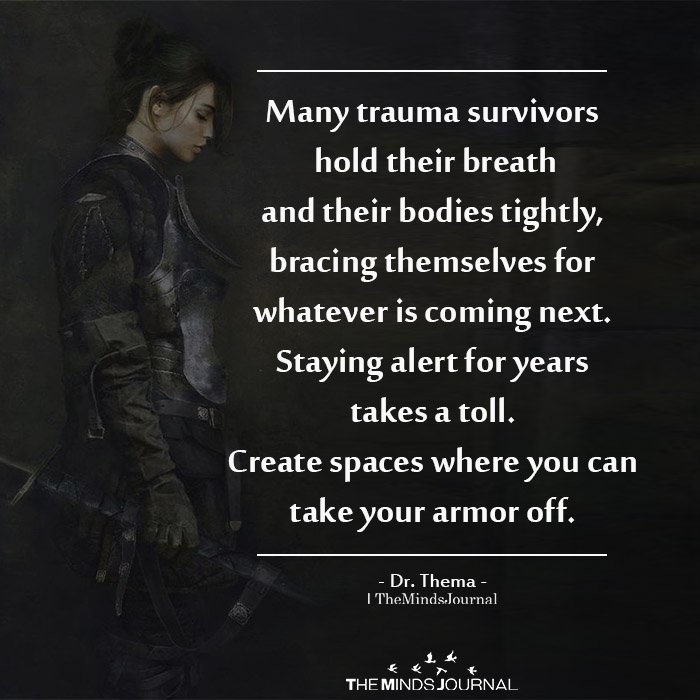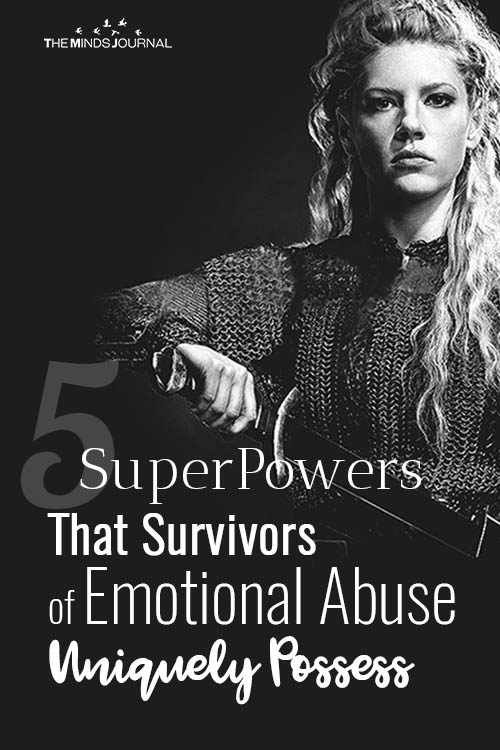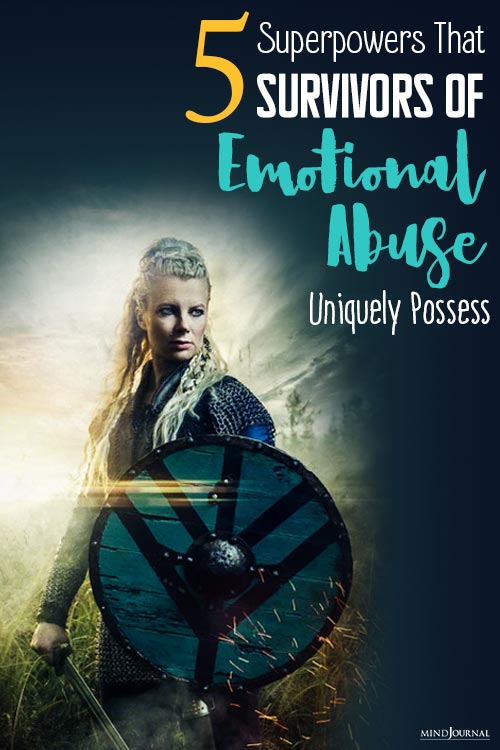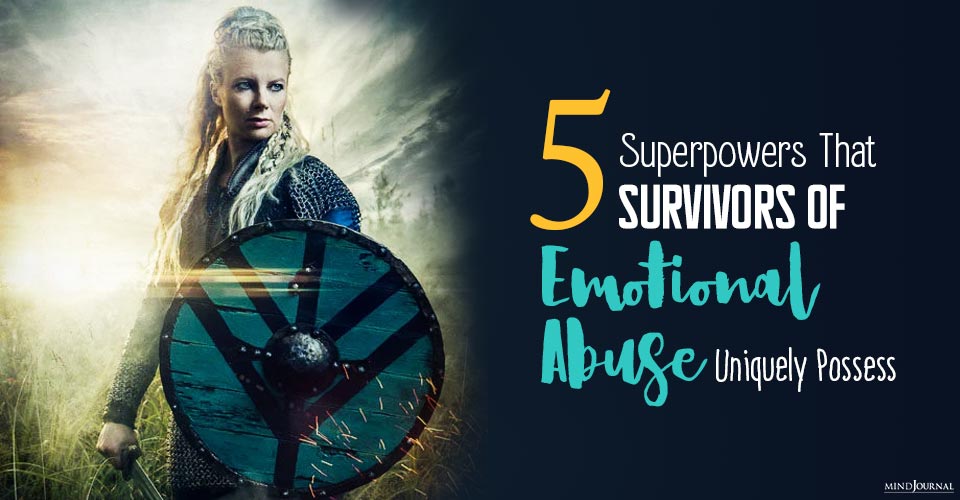As a therapist working with survivors of narcissistic abuse, I am consistently in awe of my clients’ willpower, fortitude, determination, and courage as they emerge free from abuse and trauma. Whether impacted in work, family, or romantic relationships, survivors of emotional abuse have a special kind of resilience that is akin to possessing several superpowers.
In the psychology community, this striking empowerment is entitled post-traumatic growth, which essentially means rising to a higher level of functioning after experiencing significant adversity.
Connect with your inner Lagertha (Viking Shieldmaiden) and read on below to “get woke” on your kick a*& superpowers…
Again, not all survivors are codependent. The vast majority of survivors I have worked with are actually highly emotionally intelligent and possess the “super traits”.
Emotionally intelligent people are ironically very attractive to personality-disordered individuals for the very reason that such insightful people possess the very qualities the abuser is lacking. Survivors of narcissistic abuse are not broken!
On the contrary, survivors have SuperPowers that allow them to not only do the work of healing from the trauma of being in an emotionally abusive relationship but also be great partners in healthy relationships in work, family, and love.
The following are some SuperPowers that survivors of emotional abuse uniquely possess (and I should also add, need to be very protective of).
Related: 7 Strengths Of Survivors Of Emotional Abuse
5 Superpowers Survivors Of Narcissistic Abuse Possess
1. High empathy and compassion
Survivors I have worked with generally show an amazing capacity to empathize with their fellow human beings and creatures on the planet, and they are quite intuitive, some with deeply intuitive abilities.
Many have described themselves as “empaths,” which basically means highly intuitive and with deep compassion for other living beings and nature.

2. Great ability to reciprocate and compromise/problem-solve
I saw a meme that showed a picture of a donkey’s head poking out of a barn door with the phrase: “You don’t have to be a Jack-Ass Whisperer.” So many of my clients are outstanding problem solvers and also know how to resolve conflict and compromise in very difficult situations. They have great people skills and diplomacy.
When they are in the throes of a relationship with a narcissist or other emotional abuser, they realize that to have to explain what is common sense (emotionally) to another person says a lot about the abuser, than the other way around. If you have to explain how to be humane, Houston, we have a problem!
3. Integrity and authenticity
Survivors are often known for their honesty and actions/words lining up very congruently. An abuser is drawn to this fabulous quality because, almost as if by osmosis, they can assume the personality of their partner just by being associated with him/her and the survivor’s good works for the community.
Even though these superpowers are something to behold and to be proud of, they are also qualities that the survivor must protect and not give away unless and until they know that the recipient is worthy of receiving such gifts and that those superpowers can be reciprocated back.
4. Accountability for actions
Most survivors I have had the honor of working with possess an uncanny strength to be able to have the humility to know when they need to own responsibility for their own mishaps and then to take action to make that change.
Unfortunately, their abusers generally do not possess this gift, and thus, gaslighting and blame-shifting/projection exacerbate the already vulnerable position a survivor finds her/himself in.
When free of abuse, survivors are able to fortify and reclaim boundaries in future relationships, paving the way for healthier interactions in love, work, and family.

5. Willingness/capacity to evolve a relationship into mature levels of true intimacy
An empathic survivor generally knows what it takes to experience a healthy love relationship. This understanding includes the awareness that at some point the infatuation stage will peter out and the roll-up-your-sleeves work of true intimacy (and the “you left the toothpaste cap off” frustrations) of really getting to know one another on a deeper level unfold.
Remember that extreme emotional abusers tend to hone in on folks who know how to do the work of relationships past the shiny high of infatuation, including all the messy and not fun work of paying bills, child-rearing, and house-tending, etc.
We know that extreme abusers do not have the capacity to evolve the relationship to a higher, more mature level and stay stuck in cycles of idealize/devalue/discard.
Survivors, however, can and do move on to experience healthy relationships in love, work, and family with healthy others who are able to reciprocate deeper levels of emotional vulnerability and trust-building.
So you see, there is great hope for survivors of emotional abuse to heal! The very qualities that were draws for abusers are also draws for emotionally healthy people. When survivors do the healing work of trauma recovery in psychotherapy, they move forward to gather stronger powers of discernment as well.
Related: 9 Things You Can Do To Help Emotional Abuse Survivors
When a survivor encounters a potential abuser, often times the “Nar Dar” Alert goes off as the survivor fine-tunes their capacity to engage in healthy connections with others post-recovery.
Most important for survivors in recovery from narcissistic abuse is to connect with competent and compassionate helping professionals who are licensed to provide psychotherapy for relationship trauma; broaden and deepen healthy social support tribe; ramp up self-care regimens, and fully own and practice the Super Powers that have been uniquely bestowed upon them.
Here’s to healing!
Namaste
Want to know more about the powers of survivors of narcissistic abuse? Check this video out below!
Written By Andrea Schneider Originally Appeared On Andrea Schneider Printed with permission













Leave a Reply